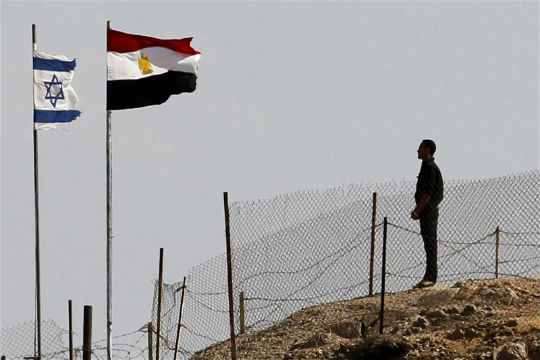Egypt says its law does not differentiate between Sudanese and Egyptian nationals

By Hend Kortam
CAIRO, Nov. 25 (Aswat Masriya) - Egypt's foreign ministry said on Wednesday that the media has exaggerated in its coverage of the situation of the "Sudanese brothers" in Egypt, stirring negative emotions over the past few days.
His comments came after two incidents this month in which Sudanese nationals were killed as they attempted to illegally cross over into Israeli territory through Egypt's eastern border.
Spokesman Ahmed Abu Zeid said in remarks to the press that "we clarified to the Sudanese side that individual cases happen because of specific legal violations, but that the law treats the Sudanese just like the Egyptian, without any discrimination or segregation."
He said some Sudanese media circles and social media have contributed to creating "negative feelings" which could have had a negative impact if they had not been heeded by officials from the two states and the people of the two countries.
Abu Zeid said the Egyptian government has taken the Sudanese complaint regarding the status of Sudanese nationals or what was perceived by some parties as the harassment or targeting of Sudanese nationals in Egypt, "with the greatest seriousness."
Abu Zeid's remarks today come on the heels of statements on Monday by the UN on the recent killings of Sudanese nationals in Egypt's Sinai's desert.
On Monday, the Egyptian armed forces said border guards killed and injured five Sudanese nationals who were attempting to cross into Israel, after firing warning shots. Egypt says the warning shots were ignored and that the migrants "initiated firing at security forces," injuring a soldier.
The killings on Monday followed a similar incident on Nov. 15, in which at least 15 Sudanese nationals were shot dead, also near the Egypt-Israeli border as they attempted to enter Israel illegally but the incident was never acknowledged in an official statement.
The killings on Monday prompted the Sudanese foreign minister to address the former incident before parliament, confirming that 16, not 15 people were killed, according to Reuters.
Later on Monday, the spokesman of UN Secretary-General Ban Ki-moon said that Ban "remains deeply troubled" by reports on the killing of Sudanese refugees near the Egypt-Israeli border.
He "urged the Egyptian authorities to launch a full investigation," describing the incidents as "tragic events".
But the UN's position was not welcomed by Egypt. Egypt rejected the statements criticizing Ban's "persistence on issuing premature statements and criticisms without relying on accurate information."
On Tuesday, Egypt's Foreign Minister Sameh Shukri and his Sudanese counterpart Ibrahim al-Ghandour discussed bilateral ties in a phone call. They asserted the "strength" of ties between the two states, stressing the importance of being vigilant against "attempts" to create rifts between Egypt and Sudan.
This is not the first time Sudanese nationals are targeted by Egyptian security forces along Egypt's borders.
In a report dating back to 2008, Human Rights Watch (HRW) said Egypt should end the "shoot to stop" policy to prevent migrants from crossing. The watchdog said Egypt should "halt the use of lethal force against border crossers and all deportations of persons to countries where they risk persecution or ill-treatment."
In its weekly meeting today, the Egyptian Cabinet approved a draft law against human trafficking. The law stipulates punishing by imprisonment or fines anyone who smuggles people, attempts to do so or mediates smuggling.
There are several instances when the law punishes by life in prison and a fine of no less than EGP 200,000 (around $25,550), such as if the crime is committed by an organised criminal group to commit acts of terrorism; if a migrant dies or suffers from a permanent disability or if the migrants include women and children, among other cases.
When it was up for discussion in September, then-minister of transitional justice Ibrahim al-Henedi said the law regards illegal immigrants as victims.
The Cabinet gave instructions to carry out a media campaign to raise awareness about the risks involved in illegal immigration.
The Sinai desert, specifically Egypt's eastern borders, had for years been used as a route to Israel by thousands of migrants from different parts of Africa, including Sudan and Eritrea, who pay smugglers in the hope of greener pastures outside Egypt.
But since 2010, according to HRW, many have ended up in North Sinai against their will.
An HRW report issued in February 2014 said, "until 2010, they passed through Sinai voluntarily and generally without problems and crossed into Israel. But over the past three years, Sinai has increasingly represented a dead-end comprised of captivity, cruelty, torture, and death."
At that time, smugglers began to turn on clients for ransom, torturing victims and making their relatives pay through extortion. But even after relatives paid the smugglers, the victims were often sold to other traffickers instead of being released.
The report which was based on dozens of interviews with victims and two traffickers said that Sudanese and Egyptian security forces "colluded" with the traffickers.
Yet, the long journey which takes the migrants, many seeking asylum from conflict-ridden countries, to Egypt's Sinai and finally to Israel, often ends badly.
The Israeli state does not welcome migrants and has taken several measures to stop their influx.
In January 2012, Israel passed a law that allows the "automatic detention" of anyone who enters the country without permission, including asylum seekers, Amnesty International criticized in a statement after the Israeli parliament passed the law.
The watchdog said the law was aimed "at those entering via the Egyptian border."
Then-deputy director for MENA at Amnesty Ann Harrison, said "Israel has the right to protect its borders, but it does not have the right to abandon its international human rights obligations to asylum-seekers, refugees and migrants, or to criminalize them as 'infiltrators', which only fuels xenophobia and discrimination."
More recently, in December 2013, Israel completed the construction of a barrier along the Egyptian-Israeli border to block migrants' access to Israel through Egypt.









facebook comments